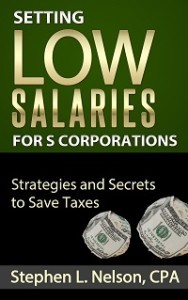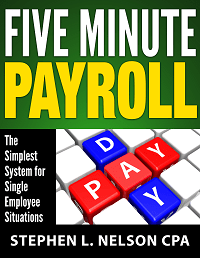 I stumbled onto an online forum discussion recently where participants were berating some new S corporation owner about paying zero S corporation shareholder-employee wages.
I stumbled onto an online forum discussion recently where participants were berating some new S corporation owner about paying zero S corporation shareholder-employee wages.
Now, I need to tell you that you are required if you operate as an S corporation to pay shareholders reasonable compensation. The Subchapter S election acceptance letter you get from the IRS makes this point in firm, almost threatening language.
But the truth is, a variety of situations exist where an S corporation can set a shareholder-employee’s wage to zero.
Zero-wages Scenario #1: You’re Not Working
So a first, maybe too obvious situation: If you’re not working in an S corporation—like say you used to work in the business but you’ve now retired—you don’t need to pay yourself wages.
A “reasonable wages” amount for someone who doesn’t work in the business equals zero.
By the way, if you are going to take this position, you obviously need other people working in the business doing the job you used to do if the business still actively operates.
And just to make this obvious but awkward point: If you’re really working in the business? Even if you’re working only a little bit? Hey, you have to pay yourself wages. No question.
Note: A decade or so ago, I heard an IRS technical issues advisor (which is a sort of internal consultant at the Internal Revenue Service) cleverly make this point in a practitioner forum, “Hey, if grandma is retired in Florida and her grandkids are running the S corporation back in Seattle, we’re not going to try and argue she needs to have shareholder-employee compensation.”
Zero-wages Scenario #2: You Don’t Take Distributions
Another supportable zero-wages scenario occurs when the S corporation pays no wages but also pays no distributions or other payments to a shareholder.
In other words, if you have an S corporation that makes $100,000 in profit and the corporation pays out none of this profit as wages or as distributions to shareholders, you don’t need to worry about a zero wages situation.
Here’s why: The IRS can’t force you process payroll. They can only re-categorize amounts (like distributions) that you’ve paid out to a shareholder as wages if you haven’t paid reasonable compensation. Accordingly, if you haven’t paid out anything to a shareholder—if all the profits for the year still sit there in the company checking account—you don’t need to worry about not having reasonable compensation for a shareholder.
By the way, a quick caveat: This “no distributions to re-categorize” scenario isn’t a long-term solution. Eventually you’ll want to withdraw your profits. And when those draws start, you’ll have to start taking care of the payroll business.
But sometimes the “no distributions to re-categorize” scenario solves the shareholder-employee compensation for a new S corporation.
Zero-wages Scenario #3: You’re Losing Money
One final potential zero-wages scenario is worth mentioning: the case where your S corporation is losing money.
Now let me clarify that probably this scenario is a variant of the scenario where you’re not taking distributions. But because this is a special mess, let’s talk specifically about the situation where your S corporation loses money and you’re taking a salary.
If your S corporation loses money, you have probably stopped your distributions. And you may even be feeding the losses by investing additional personal funds in the business.
In this case, you can probably also stop or pause shareholder-employee payroll.
You don’t want to be in situation where you, for example, invest an additional $20,000 into your S corporation so you can pay yourself another $20,000 of wages. This set of transactions has no income tax effect. The $20,000 of wages expense deduction on the S corporation’s tax return and the $20,000 of wages income you receive from the corporation cancel each other out.
But the roundtrip the money takes probably triggers $3,000 to $4,000 of payroll taxes. When you pull the $20,000 back out of the corporation in the form of wages, you’ll owe roughly $3,000 of Social Security and Medicare taxes and then probably also state unemployment taxes and workers compensation taxes.
If you are in a situation where your S corporation loses money, therefore, talk with your tax accountant about temporarily zero-ing out your shareholder-employee payroll.
Two Downloadable eBooks You Might Find Interesting
People regularly email or call and ask about a couple of things: how to set an S corporation salary and how to do payroll for a single employee situation easily and cheaply.
Accordingly, we’ve published a couple of economical ebooks: our Five Minute Payroll ebook and our Setting Low Salaries for S Corporations ebook.
Completely updated for 2017, the Five Minute Payroll ebook explains how to do simple cookie-cutter payroll for most one-employee S Corporations using base salary amounts of $10,000 a quarter or $16,000 a quarter. (These amounts mean annual compensation levels of $40,000 or $64,000 for a shareholder employee and this may work, especially if combined with a pension or health benefits, for almost everyone.)
The Five Minute Payroll e-book includes sample IRS forms you can copy to get your quarter end or year end payroll done in a few minutes, including 941s, W-2/W-3 and 940. Furthermore, the e-book provides some common-sensed tips you can use to set a reasonable salary for your S corporation and to minimize your state payroll taxes burden, too.
If you’re interested in buying and then downloading this ebook (price $20), click this button:
Written in plain, everyday language, our Setting Low Salaries of S Corporations ebook explains how to save thousands of dollars a year with your S corporation–but at the same time how you can do so ethically and responsibly and in a way that minimizes both the chance that your S corporation tax return will be examined and the chance your S corporation salary will be rejected by the Internal Revenue Service.
 Priced at $37.95, this ebook should save you thousands of dollars a year in payroll taxes. To buy and download the S corporation salaries ebook, click this button:
Priced at $37.95, this ebook should save you thousands of dollars a year in payroll taxes. To buy and download the S corporation salaries ebook, click this button:
Accordingly, if you want help with this tax decision, you may also want to get and carefully read my short, easy-to-understand ebook, Setting Low Salaries for S Corporations. But do note: If you’re a CPA firm client, you don’t need to purchase this ebook. Just email us and ask for your complimentary copy.
Click for more info or to purchase and download
A final comment. All of our monographs and ebooks come with a money back guarantee. If you don’t think what we deliver is worth the price you’ve paid, just let us know and we’ll refund your purchase price. (Refunding your purchase price, by the way, often takes a work day or two because the funds get handled manually when we’re in the office.

Hi Steve – If the S-corp has a low income year making say only 25% or less of it’s usual revenue, would you then just take a reduced salary ? I thought you could just forego the salary if revenues were extremely low. Thanks – very helpful site.
I would reduce your distributions first. And mostly.
Remember that an employee would still expect to be paid even if the business was down, revenue-wise… So just because business is down doesn’t mean employees get paid less.
What if one has regular w2 wages of $90k, and scorp distributions of $7k.
Does that $7k have to come from wages?
I’m not sure I understand your question… but if an S corp distributes only $7K to a shareholder, that’s the amount that would, worst case scenario, be vulnerable to reclassification in an IRS examination.
The other question is whether the S corp had paid reasonable compensation. If the S corp has already paid $90K in wages to shareholder-employee, that would probably often be reasonable.